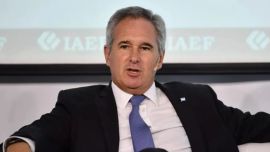The enthusiasm that President Javier Milei's libertarian experiment is arousing in local and international business and financial circles contrasts sharply with the growing conflict that his harsh austerity is provoking on the streets of Argentina, where calls for strikes are growing and unrest is on the rise.
On his social media accounts, Milei rolls off economic achievements, publishes congratulations from economists abroad and releases photographs of meetings with international personalities, whether virtual, such as his flattering exchanges with the X network czar Elon Musk, or real, such as his meeting with US Republican Senator Marco Rubio.
Milei is "a strong ally of America with a bold plan to save Argentina from a century of disastrous socialist policies," Rubio wrote on Tuesday on X, along with photos of his meeting in Buenos Aires with the president.
Meanwhile, on the streets, the railway union went on nationwide strike on Wednesday to demand a wage adjustment in line with 254 percent year-on-year inflation; a strike in the health sector comes into effect on Thursday; and teachers' unions have called for a walkout on the day classes are due to start next week.
The CGT, Argentina's main trade union confederation, is debating whether to organise a second national strike to capitalise on the 12-hour strike it called on January 24.
One of the CGT’s three leaders, Pablo Moyano, said in a radio interview that "social conflict will continue to grow" and warned: "Unfortunately this is going to end badly.”
"Nobody wants the president to leave" before his mandate is over, he continued, evoking the social crisis and the "que se vayan todos" protests that took place in 2001 and ended with a succession of five presidents in one week.
But "violence is exercised by the government with permanent measures and provocations," the trade union leader added.
Risky business
The strong fiscal adjustment applied by Milei since taking office "is an extremely risky decision, given that it could deepen the recession and the fall in the population's purchasing power," warned economist Juan Manuel Telechea, of the Institute of Labour and Economics at the Fundación Germán Abdala.
This "is going to test the social tolerance of a society that has already been hit hard", he warned in a column in the Cenital digital media outlet.
Milei decreed a 30 percent increase in the minimum wage in two instalments between now and March, after talks between the government, employers and trade unions broke down. Labour groups sought an increase closer to 85 percent. The minimum wage will rise to 180,000 pesos in February (around US$210) and 202,800 from March (US$236).
Meanwhile, the cost of living continues to rise. Bus fares in Greater Buenos Aires jumped 250 percent overnight, medicines have risen 326 percent year-on-year, and in the last month alone, basic foodstuffs such as bread and milk have gone up 43 percent and 37 percent respectively.
Yanina Salto, a 42-year-old domestic worker from the southern outskirts of Buenos Aires, has to take four buses a day to work. "Now I know what it's like to walk," she tells AFP while eating a sandwich at the bus stop. "I used to spend 12,000 pesos or so, but since the increase I spend 26,000 pesos [about US$30]" a month.
A similar story was shared by Luis Domínguez, a 47-year-old public employee. "Go to the supermarket and look at the litre of milk. Everything is dollarised except salaries and pensions,” he complained. "There is a general feeling of unease … but we have to let the president govern.”
First surplus in 12 years
Milei, who took office declaring "no hay plata" (“there is no money”), has embarked on a larger fiscal adjustment than the International Monetary Fund (IMF) itself recommended, pledging to end 2024 with a public finance surplus of three percent of GDP.
In January, Argentina recorded its first monthly budget surplus in 12 years, while the Central Bank’s meagre reserves rose from US$21 billion to US$27 billion.
But in a column for iProfesional, Salvador Vitelli, of the Romano Group, argued that "this unusual fiscal result" is explained by a 39.4 percent drop in government spending.
It is "the biggest year-on-year contraction in three decades," thanks to hefty cuts to pensions, transport and energy subsidies, and salaries, explained the economist.
The government is confident it has the public’s support, but polls show that Milei’s positive image is beginning to wane.
However, for the first time in a long time, a majority of those surveyed said they expect to see the economic situation improve over the next two years.
Another barometer of Argentine economic anxiety is the parallel dollar exchange, which has remained stable for weeks at around 1,100 pesos per dollar. The official dollar is worth 882 pesos.
"As long as we don't see the same old faces again, people are willing to put up with it," said Lower House Speaker Martín Menem.
But for others, such as union leader Moyano, this "ends up with people on the streets defending what they have.”
related news
by Leila Macor & Martín Raschinsky, AFP























Comments